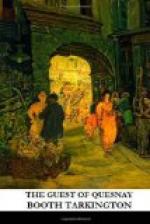He had cleared the table, and now, with a final explosion of the word which gave him such immoderate satisfaction, he lifted the tray and made one of his precipitate departures.
“Amedee,” I said, as he slackened down to his sidelong leisure.
“Monsieur?”
“Who is Madame d’Armand?”
“A guest of Mademoiselle Ward at Quesnay. In fact, she is in charge of the chateau, since Mademoiselle Ward is, for the time, away.”
“Is she a Frenchwoman?”
“It seems not. In fact, she is an American, though she dresses with so much of taste. Ah, Madame Brossard admits it, and Madame Brossard knows the art of dressing, for she spends a week of every winter in Rouen—and besides there is Trouville itself only some kilometres distant. Madame Brossard says that Mademoiselle Ward dresses with richness and splendour and Madame d’Armand with economy, but beauty. Those were the words used by Madame Brossard. Truly.”
“Madame d’Armand’s name is French,” I observed.
“Yes, that is true,” said Amedee thoughtfully. “No one can deny it; it is a French name.” He rested the tray upon a stump near by and scratched his head. “I do not understand how that can be,” he continued slowly. “Jean Ferret, who is chief gardener at the chateau, is an acquaintance of mine. We sometimes have a cup of cider at Pere Baudry’s, a kilometre down the road from here; and Jean Ferret has told me that she is an American. And yet, as you say, monsieur, the name is French. Perhaps she is French after all.”
“I believe,” said I, “that if I struggled a few days over this puzzle, I might come to the conclusion that Madame d’Armand is an American lady who has married a Frenchman.”
The old man uttered an exclamation of triumph.
“Ha! without doubt! Truly she must be an American lady who has married a Frenchman. Monsieur has already solved the puzzle. Truly, truly!” And he trulied himself across the darkness, to emerge in the light of the open door of the kitchen with the word still rumbling in his throat.
Now for a time there came the clinking of dishes, sounds as of pans and kettles being scoured, the rolling gutturals of old Gaston, the cook, and the treble pipings of young “Glouglou,” his grandchild and scullion. After a while the oblong of light from the kitchen door disappeared; the voices departed; the stillness of the dark descended, and with it that unreasonable sense of pathos which night in the country brings to the heart of a wanderer. Then, out of the lonely silence, there issued a strange, incongruous sound as an execrable voice essayed to produce the semblance of an air odiously familiar about the streets of Paris some three years past, and I became aware of a smell of some dreadful thing burning. Beneath the arbour I perceived a glowing spark which seemed to bear a certain relation to an oval whitish patch suggesting the front of a shirt. It was Amedee, at ease, smoking his cigarette after the day’s work and convinced that he was singing.




